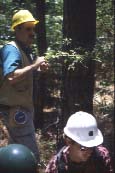BROADCASTING BAIT’S SAFER IN FIRE ANT BATTLE
DALLAS — In the struggle against fire ants, baits are best, Texas A&M entomologists advise. “Use of baits requires a little more patience, but the hazards to both users and the environment are lower,” says Dr. Mike Merchant, urban entomologist with the Texas Agricultural Extension Service. “The best news is that broadcasted baits actually work…



